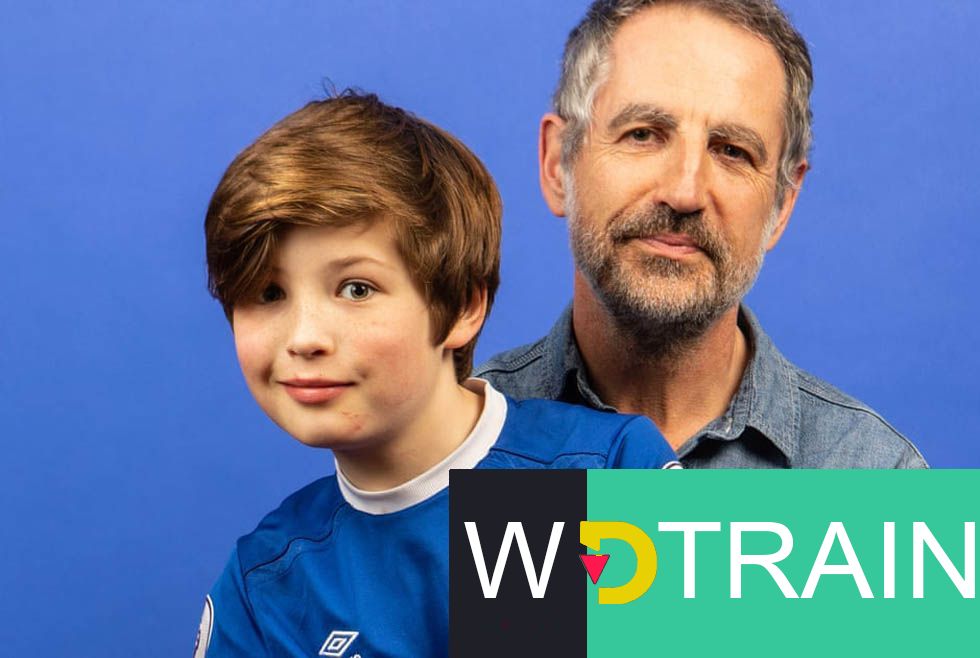“Why don’t we stay right here? Why did you ever depart?” That is Solomon, 9, one among my sons; and these are acquainted questions he enjoys directing my means. We’ve simply left Goodison Park, the bottom of Everton, our soccer staff; and we’re strolling again to my mother and father’ dwelling, not far-off. Everton gained the sport (by no means a given, just lately), and Solly is on a excessive; he desires to linger within the streets round Goodison, as he does each time we go to. He likes all of the methods the world is completely different from our dwelling. That it’s rougher, not as fairly – poorer, to place it plainly – than our bourgeois patch of Kensal Inexperienced, in London, is all upside to him. He likes the store we’ve simply popped into for sweets with its Haribos behind caged wire like a lot treasured cargo. He likes the cheeky lads on their bikes, larking round as if auditioning for a documentary devoted to “life on the road”.
If it have been a pal alongside me, I’d be teasing him for romanticising my previous dwelling, for taking a stroll on the wild aspect. Nevertheless it’s my boy and I can’t assist however smile at how a lot he’s having fun with himself.
Anyway, the blame, if blame is required, is mine. The soccer is a challenge that I went all in on. I wished not less than one among my sons to care as a lot as I care – for good or ailing – about my staff. Why? There are straightforward solutions; solutions that resemble the the explanation why I would like them to be into the Beatles or previous Simpsons episodes – it makes life simpler in case your youngsters share your pursuits; there are fewer fights over what to observe on tv, or play within the automotive.
However in different methods, nurturing the soccer attachment may be very completely different to nudging your youngster in the direction of the Beatles/Simpsons. For a begin, it’s not all about pleasure; or, to be extra exact, you possibly can’t assure pleasure. Most followers, even of these golf equipment extra profitable than ours has been just lately, deal routinely with frustration and disappointment. The important thing distinction – solemn because it may appear to the uninitiated – is that the attachment to the membership has to do with belonging, with id. As I adopted my father, so Solomon, poor man, would comply with me. And perhaps I attempted tougher as a result of we have been 200 miles away from the membership’s dwelling.
A north London native, he wished to step into my childhood
He cherished the thought of fierce allegiance and tribal division. He’d speak of classmates: “X was Tottenham,” “Y was Arsenal.” “Typical Arsenal”, he’d say, with out totally figuring out what that meant, however he appreciated the sound of it; the possibility to appraise. He appreciated, too, the chance for banter, for teasing, for rivalry. And he rapidly picked up on the politics of fandom with its insistence on actual dedication. He rehearsed the joke about one among his buddies who modifications his allegiance throughout the sport itself, relying on who’s successful. Not like him, he’d say: “Don’t fear, Dad, I’ll all the time be Everton, such as you and Grandad.” (Evidently, he additionally cherished the chance for melodramatic pronouncements.)
What I hadn’t foreseen was how soccer would develop into a gateway to a deeper attachment, to position and household; specifically to the household’s historical past in Liverpool. For context, I ought to clarify that Solomon doesn’t hear a lot in the best way of scouse nostalgia round our home in London. In actual fact, you’d wrestle to search out anybody who had rushed extra readily than I had, as a younger grownup, into embourgeoisement, as I later discovered to name it – revelling within the uncovered floorboards and bookcases of my new middle-classness. Did I wish to be a part of the ranks of these poncey metropolitan liberals? Sure please, in the event that they’d have me.
My son, nonetheless, a north London native, actually born on these uncovered floorboards and already bouncing between his theatre journeys and debating golf equipment, took a flowery to stepping again into my childhood – with its narrower choices however, as he noticed it, deeper seams.
Strolling to my mother and father’ from the bottom, he finds it fascinating that there are hyperlinks in all places that hook up with him: faculties attended by his dad or grandmother or cousin; church buildings marked by household births, marriages and deaths; parks performed in over generations. My lot has been in Liverpool for a century and extra, because the forebears left Eire; converging specifically on one avenue, the place rented houses, then social housing, could be “inherited” over generations. This historical past – one place resonating with a household’s presence and reminiscences over a very long time – will not be a part of Solomon’s common world. In his playground, there are virtually as many alternative soccer shirts worn as there are kids; his college friends’ mother and father come from throughout Britain and means past. His personal mom, my spouse, is Canadian.
In my rush to be elsewhere, I forgot the richness of place
His ardour has an impact on me, too. As Solomon presses me to summon up reminiscences of the passing buildings, I recognise how a lot I’ve begun to take from his curiosity in his “household gang”, as he calls it. Which catches me unexpectedly: over the previous few years, the flip in the direction of id within the nationwide dialog, I’ve discovered irritating, limiting. It comes with an impulse to field folks in. Do we actually wish to be outlined by others, by the place we have been born, say, or by our ethnicity? Are we completely satisfied to accept being a “citizen of anyplace” or “citizen of someplace”? And but right here was my totally unboxed hyphenate, our Liverpudlian-Canadian-Londoner, discovering one thing deeply attractive and comforting in belonging – initially by soccer.
He asks Grandad to inform him about previous video games, and collectively they watch recorded matches; the tales my dad tells of those bleed into others, past soccer – of faculty, of labor, of what he and his buddies did for enjoyable; my mom now becoming a member of in. Some tales are well-worn, the “classics”: my dad’s childhood residing in a pub, and the occasional naughty recycling of beer bottles from the yard so his buddies may declare, then cut up, the deposit (it’s by no means too late to admit, Dad); my mom’s late teenage years within the Cavern throughout Merseybeat. However some are new to me: how a lot simpler it’s for a grandchild to ask.
All of the tales are fastened to locations shut by: the place are these venues, these factories now, Solomon asks. Can we stroll there, contact them, scent them? (We are able to, although the smells have a tendency to vary. No tobacco nor rum lingers within the air on the dockside warehouse, quickly to be an condominium block, the place my dad labored as a 16-year-old.) Why are we Everton, not Liverpool? And I’m reminded, as we stroll him by the historical past, that the sport, which served as a immediate to all of the boy’s wider questions, can itself go deep. The reply, because it occurs, is that whereas the founders of Liverpool FC have been wrapped up within the Tory celebration and had robust hyperlinks to the Orange order, the early Evertonian boards tended to be Liberal and would seduce the native Catholic citizens by presenting in favour of Residence Rule for Eire. My dad, educated by the Christian Brothers, landed on one aspect. There’s good enjoyable available in reminding my Liverpool FC friends, particularly these of a liberal bent, of this historical past.
As Solomon drinks all of it in, I’ve additional purpose to thank my nine-year-old sage, additional purpose to benefit from his enthusiasm. Accounts of neighbourhoods just like the one I’d grown up in, dwelling to my mother and father and our soccer membership, can fall right into a grim sample. The issue will not be within the documenting of social ills – after all not, that’s the job, our job. (And if levelling up ever proves to be greater than a phrase, its objective is definitely to lend extra choices to these residing in such areas.)
Nevertheless it’s the flatness of the lives depicted that may jar, the greyness – as if color, vitality exists elsewhere. It’s there within the very thought of being “left behind”; there’s a clue within the phrase. The richness of lives is usually missed; the richness fashioned by historical past, by reminiscence, by place. It blows Solomon’s thoughts that our household – the kind of folks now typically used because the “stable”, “unchanging” distinction to the fluid, fast-changing world by which the boy grows up – have been as soon as migrants too, struggling to barter the methods of a brand new nation, responding to very large change. And never that many generations in the past; so shut he can contact their delivery certificates, hear about them, examine them. Perhaps I’d forgotten a little bit of this richness myself, in my rush to be elsewhere. The boy, against this, hasn’t missed a factor. The boy executed good.






